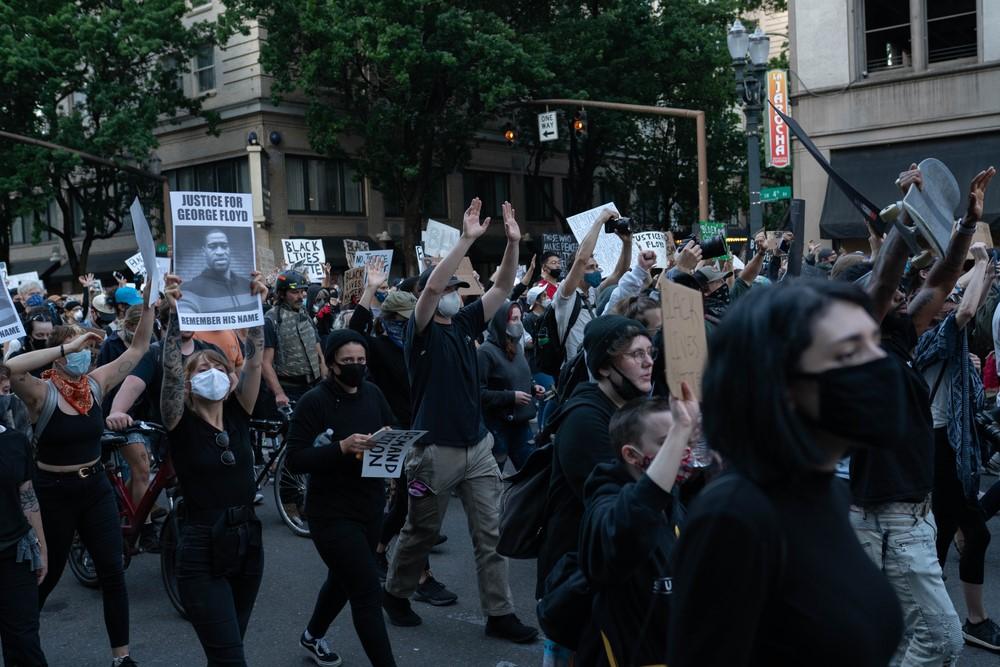
Multnomah County leaders and health officials say they’re ready to begin the first phase of reopening on Friday, despite three straight weeks of rising COVID-19 hospitalizations and the unknown public health impact of nearly two weeks of massive protests in downtown Portland.
County commissioners expect to learn the fate of its phase 1 application Thursday. If the Oregon Health Authority gets the go-ahead, Multnomah County restaurants, bars, gyms and other public facilities could start reopening the following day under strict occupancy and hygiene restrictions.
Several key indicators are working against Oregon’s most populous county, however, and some public health advocates are urging the state to delay accepting Multnomah County’s application.
After weeks of declines from a mid-April high of 40 COVID-19 hospitalizations, weekly hospitalizations have been on the rise again – from nine the week of May 17, to 11 the following week and 14 during the final week of May.
“In a community of 800,000 people, that’s a relatively few people,” Dr. Jennifer Vines, the public health officer for Multnomah County, told commissioners Wednesday. “But there’s no question there is an uptick.”
It’s an important marker in the state’s reopening guidelines. The Oregon Health Authority’s six criteria for counties to meet includes declining COVID-19 hospital admissions over 14 days prior to reopening.
But the state and Gov. Kate Brown have shown a willingness to look past some of those requirements in the past. Initial applications by Marion and Polk counties to enter phase 1 were denied in mid-May, due to those counties’ rising hospitalizations at the time. But the state approved their revised applications a week later.
On Wednesday, county health officials told commissioners that the state would likely review Multnomah County’s application more broadly than making an approval or rejection based on one metric.
“The state has pretty consistently shown in approval of the other counties’ applications that they’re looking at it case by case,” Multnomah County Public Health Director Rachael Banks told commissioners. “One specific metric may not outweigh the ability to approve applications. They’ve consistently shown flexibility in approving folks who aren’t meeting one metric. They’re really looking at the totality of the whole situation.”
Yet Multnomah County was missing two other metrics as of June 4, according to the most Oregon Health Authority data: New cases in the county had increased 126% over the prior week, far higher than the 5% threshold the state is targeting. And 35% of the new cases couldn’t be traced to a known source, slightly above the state’s 30% benchmark. The county is meeting benchmarks for low rates of emergency department patients with coronavirus symptoms, declining percentages of positive tests and follow-ups initiated with new cases within 24 hours.
County Chair Deborah Kafoury said Multnomah County has shown that it can slow the spread of the virus. Medical clinics have built up adequate supplies of personal protective equipment and regional hospitals have attested they have the capacity to handle large spikes in hospitalizations should they occur.
“It is my belief we have to learn to move from the emergency phase to learning to live with the virus. We’re going to be constantly watching the numbers, listening to our community, and we’re going to be implementing plans created around testing, contact tracing and isolation,” Kafoury said. “We’ll make adjustments as needed throughout the process until we end up with a vaccine or cure.”
But some health advocates have urged the state to slow down as statewide COVID-19 cases have spiked in recent days. The Oregon Health Authority on Sunday reported 146 new cases, driven partly by outbreaks at food processing plants and agricultural businesses. It was the largest single-day tally in new cases since the pandemic’s outset.
“There are probably a lot more cases out there already that we’re not aware of,” Numi Lee Griffith, patient health care advocate for the Oregon State Public Interest Research Group, told The Lund Report following commissioners’ meeting Wednesday. OSPIRG highlighted rising daily cases and Multnomah County hospitalizations in a report urging the state to hold off on approving any new county applications.
“The numbers that we’re seeing today are the results of things that happened two or three weeks ago,” Griffith said.
In a report published Wednesday, Griffith called on the state to wait to allow Multnomah County to move forward: "It would be deeply irresponsible for the state to continue moving forward without taking the time to evaluate the worrisome trends we’ve seen this week. Multnomah County should not be approved for Phase I until cases begin to fall again."
It’s too soon to know how the daily protests in Portland over the death of a Black Minneapolis man by a white police officer may be spreading the coronavirus, health officials said Wednesday. Large crowds have demonstrated predominantly in the downtown area since May 29.
Many protesters in Portland have worn masks but almost no one has respected social distancing rules.
"Frankly, I am worried about the increasing cases and hospitalizations locally as well as trends in other parts of the country," said County Commissioner Dr. Sharon Meieran, an emergency room physician. She said she'll be monitoring the situation and "will continue to advocate to the rest of the board that face coverings be made a requirement so that risks can at least be mitigated during these uncertain times." But she said she trusts county health officials who are tracking the data.
“So far we’ve identified very few, virtually no cases linked to the protests,” Multnomah County Communicable Disease Director Kim Toevs said. But any health information the county has received to date related to the protests has been voluntary. Whether large numbers of COVID-19 cases grow from the protests could take weeks to determine.
“We presume there are a number of cases of people with COVID-19 that do not know they have it on any given day in any large setting,” Toevs said.
You can reach Elon Glucklich at [email protected].